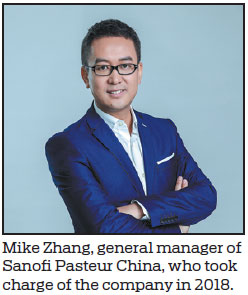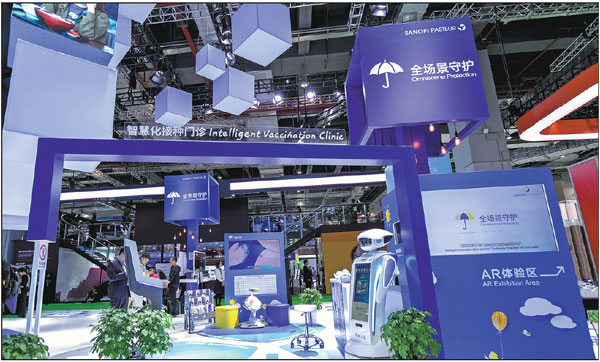Sanofi Pasteur puts latest innovative vaccines on show
When it comes to disease, it's always better to prevent than to treat after one occurs. Since their invention centuries ago, vaccines have proven to be one of the best embodiments of such a notion, barring the spread of contagious, dangerous and even deadly diseases.
But the fact that the world's most populous nation, China, has only a 2 percent uptake rate for vaccines like influenza, according to Feng Zijian, deputy director of the Chinese Center for Disease Control and Prevention, means huge opportunities and equally important responsibilities for global vaccine makers.
Sanofi Pasteur, one of the world's leading vaccine producers and the vaccine arm of Sanofi, has bold visions and is eyeing enterprising undertakings.
As China and France celebrate the 55th anniversary of the establishment of diplomatic relations, Sanofi Pasteur's extensive footprint in China serves as the perfect testimony of the longstanding bilateral friendship and even rosier future ahead, said Mike Zhang, general manager of Sanofi Pasteur China, who has been working with multinational pharmaceutical companies and joint ventures for more than 13 years and who took charge of Sanofi Pasteur's business operations in 2018.
|
Sanofi Pasteur brings its innovative vaccines, as well as smart and standardized vaccination procedures to the second CIIE in Shanghai. Photos Provided to China Daily |
According to Zhang, the vast China market represents not only a lively business opportunity but a thriving land where the vaccine giant stands to drive the country's public health development through effective immunization efforts.
"We've seen this shift from a focus on disease treatment to public health management in China, and disease prevention has been a key focus in China's agenda to build a healthier nation," he said.
Zhang referred to the Healthy China 2030 plan, a grand initiative guiding the nation's public health development. Upholding the so-called "prevention first" principle, China has officially recognized vaccination to be one of the best approaches to prevent infectious diseases.
"Apart from ensuring sufficient and quality supplies, we feel it imperative to enhance vaccine production capabilities and raise the uptake rate through all means," he said.
It's not the first time the French vaccine maker finds its business priorities in rhythm with that of the country's strategic priorities.
If history is any indication, parent Sanofi's long-term commitment to China can be traced back to 1982, just four years after China's reform and opening-up policy was introduced to boost economic vitality.
Being one of the first international vaccine manufacturers to make a presence on the Chinese mainland in the 1990s, Sanofi Pasteur has since been relentlessly improving health and empowering life, supporting immunization and disease prevention through the introduction of several crucial vaccines.
The company stepped up localization efforts, investing $94 million in 2017 to construct a dedicated influenza vaccine facility in Shenzhen, one of China's bridgeheads for economic reform and opening-up in Guangdong province.
The company has spared no effort in cooperating with Chinese authorities, trade associations and research institutions to expand immunization programs.
For instance, the company has supported the Chinese health authorities in the National Immunization Plan as well to echo the World Health Organization goal of certain disease eradication. It partnered with the Chinese Preventive Medicine Association to launch a threeyear cooperation program in 2017 to raise awareness about vaccinations as an effective approach to improving the health of ordinary people and medical professionals.
This year, Sanofi Pasteur and the Chinese Maternal and Child Health Association signed a collaboration agreement known as the Maternal and Child Friendly Initiative, with an aim to enhance the protection of newborns through immunization education for mothers-to-be.
According to the company, it provides more than 5 million doses of influenza vaccines in China every year. It is expected to reap a 70 percent year-on-year growth in net sales revenue in China by the end of 2019.

But in China, Zhang has noticed an even more encouraging change than delivering robust balance sheets per se: the accelerated and simplified procedure for vaccine clinical test-trials and approvals. The company is unveiling its latest vaccines at the second China International Import Expo.
During the second CIIE, Sanofi Pasteur introduced a concept dubbed "omniscene protection", by joining hands with industry heavyweights from internet giant Alibaba, as well as the Shanghai Municipal Disease Prevention and Control Center.
Under the auspices of such tie-ups, people stand to gain more access to vaccine-related knowledge and will be able to book and pay for vaccinations. People will also be able to trace the origins of their vaccines to guarantee security and quality - all via mobile phones.
"The common thread running through the entire vaccination cycle is data, whose sharing and smart deployment will assist authorities to keep track of disease prevention and data accumulation nationwide," he said.
Beyond that, Sanofi Pasteur said it is hoping for the faster introduction of, and better accessibility to, innovative vaccines, holding true to its long-term China commitment. To this end, it entered into a partnership with the Shenzhen government on Wednesday, inking the Sino-French Agreement for Strategic Collaboration on Vaccine Innovation.
To be more specific, Sanofi Pasteur wants to turn Shenzhen into a hub to explore a new model for accelerating the launch of globally leading vaccines, and to work with the government to improve the accessibility of innovative vaccines.
Other innovative endeavors include a bid to build the country's first "integrated digital healthy city". Such a model is to improve the influenza vaccination rate, employ big data to establish a vaccination evaluation system and delve more deeply into relevant research.
"It takes the joint efforts of all stakeholders to contribute to the Healthy China 2030 vision and cater to people's health needs in every aspect and every stage of life," Zhang said.
"By launching the 'omniscene protection' initiative, we hope to join hands with more partners to continuously improve the 'smart vaccination ecosystem', to make vaccination easier, safer and worry-free, and to help make the 'Healthy China' dream come true."
(China Daily 11/08/2019 page7)















